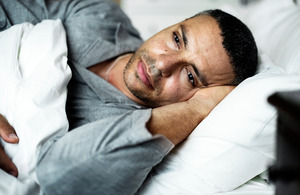How Temperature Can Make Sleep Apnea Worse
April 11, 2023

Sleep apnea can make it extremely difficult to get the rest you need to perform at your best during the day. And as challenging as the disorder can be by itself, it can potentially be worsened by certain environmental factors. In particular, the temperature of where you’re sleeping can make a significant difference. Here’s why you might have more trouble with sleep apnea when it’s hot.
What is Sleep Apnea?
Sleep apnea is a highly common sleep disorder that is thought to affect around a fifth of the population. It’s characterized by pauses in breathing that can occur multiple times in a single night. Each pause causes your body to wake up so that breathing can resume. The awakenings are usually so short that you might not even remember them.
When left untreated, sleep apnea can be extremely dangerous. Not only can it significantly increase your risk for heart problems, but it can also make it more likely that you’ll experience an accident while driving due to exhaustion.
How Does Temperature Affect Sleep Apnea?
So how can high temperatures worsen sleep apnea? The key lies in your body’s natural processes. When you fall asleep, your body temperature goes down. If the environment where you’re sleeping is too hot, it will be harder for your body to reach the right temperature, and you’ll be more likely to wake up during the night. Since sleep apnea frequently interrupts your slumber, higher temperatures can add to the problems that you’re already having.
How Can You Manage Sleep Apnea When It’s Hot?
In order to keep your sleep apnea under control, you need to take whatever steps you can to make your bedroom the best possible environment for getting quality rest. If it’s too hot, it’s generally a good idea to turn on your air conditioner. You might also want to consider removing the comforter from your bed and sleeping under a sheet instead.
Of course, there’s more to managing sleep apnea than just maintaining a cool bedroom. You also need to make sure that you’re getting the right kind of treatment. Talk to a professional to see what kind of solutions are available for improving the quality of your sleep.
In many cases, your dentist can help you address sleep apnea symptoms with oral appliance therapy. An oral appliance works by slightly changing the position of your lower jaw; this can help keep your airway clear at night so that your breathing is less likely to be interrupted.
While sleep apnea can have dire consequences, it’s completely possible to get the disorder under control. To do so, it’s important to be aware of all the factors that are affecting the quality of your sleep so that you can take the correct steps to deal with them.
About the Author
Dr. Jacob Milner went to the University of Maryland School of Dentistry. He worked as an associate dentist for six years in Hanover, PA. Today at Dolfield Dental of Owings Mills, he focuses on showing his patients that dentistry doesn’t have to be stressful. He offers oral appliance therapy to help his patients keep their sleep apnea symptoms under control. To schedule a consultation with Dr. Milner, visit his website or call (410) 902-4110.
No Comments
No comments yet.
RSS feed for comments on this post.
Sorry, the comment form is closed at this time.
